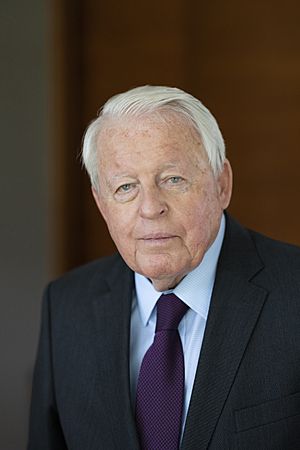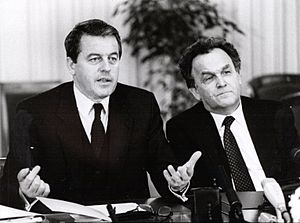Franz Vranitzky facts for kids
Quick facts for kids
Franz Vranitzky
|
|
|---|---|

Vranitzky in 2020
|
|
| Chancellor of Austria | |
| In office 16 June 1986 – 28 January 1997 |
|
| President | Rudolf Kirchschläger Kurt Waldheim Thomas Klestil |
| Vice-Chancellor | Norbert Steger Alois Mock Josef Riegler Erhard Busek Wolfgang Schüssel |
| Preceded by | Fred Sinowatz |
| Succeeded by | Viktor Klima |
| Chair of the Social Democratic Party | |
| In office 11 May 1988 – 9 April 1997 |
|
| Preceded by | Fred Sinowatz |
| Succeeded by | Viktor Klima |
| Minister of Finance | |
| In office 10 September 1984 – 16 June 1986 |
|
| Chancellor | Fred Sinowatz |
| Preceded by | Herbert Salcher |
| Succeeded by | Viktor Klima |
| Personal details | |
| Born | 4 October 1937 Vienna, Federal State of Austria (now Austria) |
| Political party | Social Democratic Party |
| Spouse |
Christine Christen
(m. 1962) |
| Signature | |
Franz Vranitzky, born on October 4, 1937, is an important Austrian politician. He was the leader of Austria, known as the Chancellor, from 1986 to 1997. He belonged to the Social Democratic Party (SPÖ).
Contents
Early Life and Education
Franz Vranitzky grew up in Vienna, Austria. His father worked in a foundry. He studied economics and finished his degree in 1960. To pay for his studies, he taught Latin and English. He also worked as a construction worker.
Sports and Family Life
When he was young, Vranitzky was a talented basketball player. He was even part of Austria's national team. In 1960, his team tried to qualify for the Summer Olympics in Rome.
In 1962, Vranitzky joined the Social Democratic Party (SPÖ). The same year, he married Christine Christen. They had two children together.
Early Career in Finance
Vranitzky started his career in 1961 at Siemens-Schuckert. Soon after, he moved to Austria's central bank, the Oesterreichische Nationalbank. In 1969, he earned a special degree in international business.
The next year, Hannes Androsch, who was the finance minister, asked Vranitzky to be his economic advisor. Vranitzky then worked in leadership roles at different banks. From 1976 to 1981, he was a deputy director at Creditanstalt-Bankverein. He later became its director general. He also led the Länderbank from 1981 to 1984.
In 1984, Vranitzky became the Minister of Finance. He joined the government led by Chancellor Fred Sinowatz.
Becoming Chancellor of Austria
In 1986, there was an election for president. The current Chancellor, Fred Sinowatz, strongly disagreed with Kurt Waldheim, who was running for president. Waldheim had been the UN Secretary General. His campaign caused some international discussion.
When Waldheim won the election on June 8, Chancellor Sinowatz resigned. He suggested that Franz Vranitzky should take his place.
Leading the Government
Vranitzky became Chancellor on June 16, 1986. At first, he continued the government with the Freedom Party. However, in September 1986, a new leader, Jörg Haider, took over the Freedom Party. Vranitzky decided to end the partnership. He called for new elections.
In the elections held on November 23, 1986, Vranitzky's party, the SPÖ, remained the strongest. In January 1987, Vranitzky formed a new government. This was a "grand coalition" with the second-largest party, the Christian democrat ÖVP. Alois Mock became the vice-chancellor and foreign minister. In 1988, Vranitzky also became the chairman of his own party.
International Relations and EU Membership
For several years, Austria's foreign policy faced challenges. This was due to the discussions around President Waldheim. Some countries, like the United States, did not allow Waldheim to visit. Israel also recalled its ambassador. Vranitzky worked hard to improve Austria's relationships with these countries. He often took on diplomatic duties usually done by the president.
On July 8, 1991, Vranitzky gave an important speech. He said that Austrian citizens shared responsibility for harm caused to others. This was a change from the previous idea that Austria was "Hitler's first victim."
After the Cold War ended, Vranitzky focused on building stronger ties with Eastern European nations. He also strongly supported Austria joining the European Union. On June 12, 1994, Austrians voted in a referendum. About 66% of people voted to join the EU. Austria officially became a member in January 1995. Austria's military neutrality was confirmed during this process.
Political Challenges and Resignation
Vranitzky kept his distance from Jörg Haider's Freedom Party. In the 1990 election, Vranitzky's coalition government continued. His party's votes stayed strong. In the 1994 election, both main parties lost some support. However, they remained the two largest parties. Vranitzky renewed the coalition with the ÖVP.
Later in 1995, the grand coalition broke apart over budget disagreements. This led to new elections in December 1995. The results showed only small changes. Vranitzky and Wolfgang Schüssel formed their coalition again in March 1996.
In January 1997, Vranitzky resigned as Chancellor. He also stepped down as his party's chairman. His finance minister, Viktor Klima, took over both positions.
After Being Chancellor
After leaving office, Vranitzky worked as a representative for the Organization for Security and Co-operation in Europe in Albania. This was from March to October 1997.
He then returned to the banking world. He became a political consultant for the WestLB bank. In December, he joined the board of governors for Magna International, a car parts supplier. He later held similar positions for the tourism company TUI and Magic Life hotels.
In June 2005, Vranitzky donated one of his kidneys to his wife, Christine. She had a long-term kidney problem.
He supported his party's leader, Alfred Gusenbauer, in the 2006 elections. Vranitzky also leads quarterly meetings called Vranitzky colloquia. These meetings discuss economic topics and their effects on Austria and Europe.
Images for kids
See also
 In Spanish: Franz Vranitzky para niños
In Spanish: Franz Vranitzky para niños
 | Isaac Myers |
 | D. Hamilton Jackson |
 | A. Philip Randolph |


